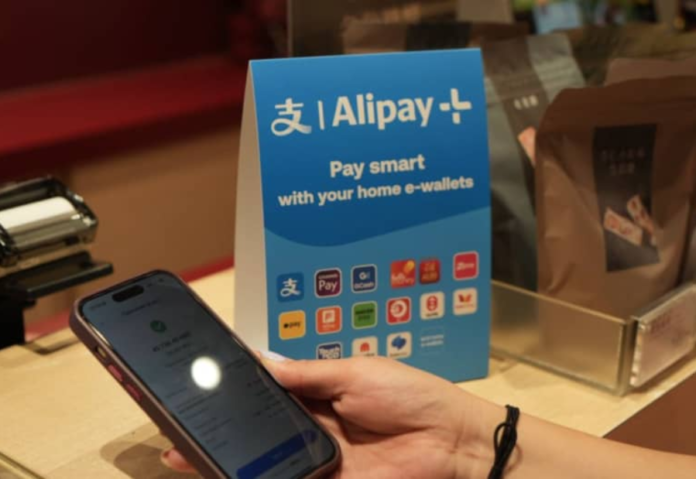
Ant Group plans to expand its Alipay+ offering into the payment markets of Europe, the Middle East, and Latin America.
Ant Group, a major Chinese financial company, is trying to expand its global reach through its digital service, Alipay+, which aims to connect mobile payment apps throughout the world.
“What we discovered is that consumers prefer to use their native e-wallets when traveling overseas. According to Douglas Feagin, senior vice president of Ant Group, an offshoot of Chinese digital giant Alibaba, customers prefer not to enter their card information into unfamiliar apps.
In 2020, the group’s worldwide subsidiary, Ant International, launched Alipay+, which allows foreigners to utilize apps from their home countries to make payments in China by scanning QR codes on Alipay, Ant Group’s mostly domestically oriented platform, and in other countries through local partners.
“We see a huge opportunity for expansion and the relatively broad coverage we have in Asia, which we would like to replicate in places like the Middle East, Latam, and Europe,” Feagin said. “People from all these regions are going to other regions, so there is a big opportunity to expand.”
Ant has invested in country-specific e-wallets around Asia, but the CEOs wanted to expand their goods internationally, according to Feagin, also president of Ant International.
According to Feagin, the company received some cross-border tourism business from consumers traveling outside of China, but it was “mostly focused on where Chinese tourists go.” Ant had entered Europe and the United States, where Chinese tourism was thriving prior to the COVID-19 outbreak, using Alipay.
“We had the advantage that Alipay was already accepted by many retailers around the world, so one of our first initiatives was to convert those businesses to Alipay+ merchants.” So, instead of just accepting one wallet, they can accept multiple wallets,” explained Feagin.
Alipay+ currently connects 88 million merchants in 57 countries and regions to 1.5 billion customer accounts via more than 25 e-wallets and bank apps, according to Ant.
Ant acquired investments in various firms as part of its global business expansion, including Singapore payments provider 2C2P in 2022 and South Korea’s Kakao Pay in 2017.
Last year, Ant worked with national digital payment platforms such as Singapore’s SGQR, Malaysia’s DuitNow QR, and South Korea’s ZeroPay.
“Ant Group’s initial aim for worldwide expansion focused on Southeast Asia. In a January report, Zennon Kapron, founder and director of consultancy Kapronasia, stated that the company invested strategically in e-wallets in every major Southeast Asian market.
Ant is also expanding into emerging markets, including Sri Lanka and Cambodia. The company has also expanded into Europe and the Middle East, working with European e-wallets Tinaba in July last year, Nexi in February, and Dubai Duty Free in the Middle East at the beginning of this year.
There is also development potential in the firm’s existing regions, such as Singapore and South Korea. For example, while many people use mobile payments in China, the number is still significantly lower than in other nations, according to Feagin.
“There is plenty of space for growth. I believe that many people only consider traditional payment methods when traveling abroad.”
“When you think about the big markets that receive a lot of tourists, like Thailand and Japan, the chances for payment from mobile apps to grow are enormous.”
Ant Group’s future in China became questionable after regulators halted its initial public offering in November 2020.
Ant was also obliged to restructure into a financial holding company governed by the central bank.
“After China’s regulators ordered reorganization, which coincided with numerous geopolitical issues that hampered Ant’s capacity to develop in certain areas, the company shifted its worldwide expansion plan. The outcome was Alipay+, which tries to address interoperability issues with e-wallets,” stated Kapron.
“When you think about the big markets that receive a lot of tourists, like Thailand and Japan, the chances for payment from mobile apps to grow are enormous.”
Ant Group’s future in China became questionable after regulators halted its initial public offering in November 2020.
Ant was also obliged to restructure into a financial holding company governed by the central bank.
“After China’s regulators ordered reorganization, which coincided with numerous geopolitical issues that hampered Ant’s capacity to develop in certain areas, the company shifted its worldwide expansion plan. The outcome was Alipay+, which tries to address interoperability issues with e-wallets,” stated Kapron.
Do Follow: CIO News LinkedIn Account | CIO News Facebook | CIO News Youtube | CIO News Twitter
About us:
CIO News is the premier platform dedicated to delivering the latest news, updates, and insights from the CIO industry. As a trusted source in the technology and IT sector, we provide a comprehensive resource for executives and professionals seeking to stay informed and ahead of the curve. With a focus on cutting-edge developments and trends, CIO News serves as your go-to destination for staying abreast of the rapidly evolving landscape of technology and IT. Founded in June 2020, CIO News has rapidly evolved with ambitious growth plans to expand globally, targeting markets in the Middle East & Africa, ASEAN, USA, and the UK.
CIO News is a proprietary of Mercadeo Multiventures Pvt Ltd.





